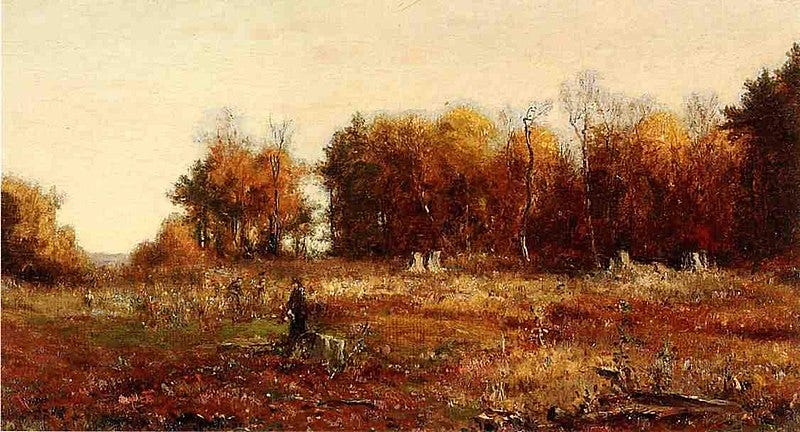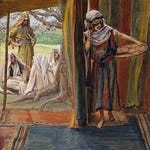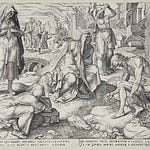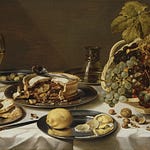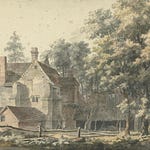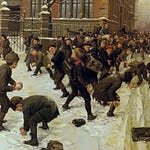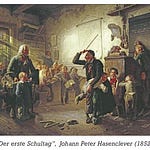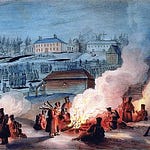I’m looking at an early Italian-English dictionary, Queen Anna’s New World of Words, put together by the scholar John Florio in 1611, and dedicated to Queen Anne, the consort of King James I. How fancy were those old books, especially when you managed to get some royal patronage! It’s got dedicatory and laudatory sonnets in Italian, Spanish, and English, before you even get to the list of words and their quick and brief definitions, and of course Florio has to write in compliment of Queen Anne, and to recommend, if she’ll forgive the phrase, his “brain-babe” of thirteen years past, which was his first World of Words, and which had now grown up into this new and augmented dictionary. Florio was an Italian living and working in England, enjoying the esteem of scholars, courtiers, publishers, and explorers, esteem which was well deserved; I suppose the next best thing would be to be an Englishman or an American living and working in Italy in the nineteenth century, like the Brownings and the Hawthornes amidst all that art and good food and sunshine, without having to worry about British or American politics.
Our Word of the Week isn’t harvest, which is what the season was called for many centuries, because that’s the thing you did when the corn was ripe; that’s still the name of the season in German: Herbst. I had a very nice German teacher at Princeton, named Frau Herbst; and in English we do have people with surnames like Summer(s) and Winter(s). Our word’s also not autumn, the word that comes to us from Latin through French and Italian. Now, if you look up Italian Autunno in Florio’s dictionary, you’ll see this: “The fall of the leaf, Autumne.” For Italian primavera, Florio puts this: “The spring-time of the year,” that is, what used to be called “the spring of the leaf.” In Old English, the spring was called lencten, for what the days were doing: they were getting longer: and that’s the source of our word Lent, applied to the liturgical season. Anyway, autumn and the fall of the leaf were in competition with each other in England at the end of the sixteenth century, and that meant that when settlers from England came over to America, they brought the competition with them. Here in America, both words remained, with fall being the more common one, and autumn just a little fancier, more highbrow. But in England, autumn won out completely, so if you hear somebody say, “Fall is my favorite season, when the maples and the oaks turn orange and red, and the sumac leaves with their arrowy points seem to be dipped in fire,” that person’s an American.
And maybe there’s more than just the use of the word fall for the season that would mark out the American. I think that all American kids at one time or another have drawn or painted fall leaves, or collected them; we used to press them between sheets of wax paper to preserve them and their colors. I wish I could recall the specifics of the story, but some time in the early nineteenth century there was an English landscape painter who came to New York and New England, who stippled his trees with the reds and golds and oranges we are used to up here. But when he took his landscapes back to England, the critics laughed at him, saying that such trees could only exist in somebody’s crazy imagination. They wouldn’t believe he’d seen such with his own eyes. Of course, there are plenty of oaks and maples in England, but I don’t know about sugar maples, or other varieties of these and other kinds of trees that put on such a display over here; and maybe the sudden nip of cold in the early fall has a lot to do with it, too — maybe the more even-keeled climate of Great Britain mutes the colors, just as it does in the American south.
Did you know, by the way, that the chemicals that make for those pigments in the leaves are there all the time? It’s just that the green-leaf — which is what chlorophyll means — overwhelms them in spring and summer. As long as that green-leaf is dominant and making sugars, the other chemicals are suppressed. But when the green-leaf fades — usually from the edge of the leaf first, working back toward the stem — the others, the carotenes (for the red colors) and the yellow-leaf, that is, the xanthophyll, have nothing any longer to get in their way. Call it the glory of the late afternoon, drawing toward evening, and with the tang of ripe and over-ripe apples in the air.
What about the word itself? We’re not sure where its Germanic ancestor came from, but it’s in all the Germanic languages, where it means pretty much the same thing, to drop, to tip over, to sink, to fall: Old English feallan, German fallen, Icelandic falla, Danish falde. Mostly it’s a bad thing to fall, as when Raphael says of Satan and his minions, “O fall / From what high state of bliss into what woe!” On the other hand, we in English do “fall in love,” right?One more little point. Old English feallan is called — here’s something for you amateur linguists — a Class VII Strong Verb, which means, as a general rule, that as you go from present to past to past participle, its vowels have the progression a (o) - e - a (o): so it’s fall, fell, fallen; know, knew, known; grow, grew, grown. The German linguists called them “strong” because they take their own principal parts, by jingo, rather than having them handed to them the same as all the other weaklings whose past tenses end in -ed and suchlike. No falling down on the job, there!
Word & Song by Anthony Esolen is an online magazine devoted to reclaiming the good, the beautiful, and the true. We publish six essays each week, on words, classic hymns, poems, films, and popular songs, as well a weekly podcast for paid subscribers, alternately Poetry Aloud or Anthony Esolen Speaks. Paid subscribers also receive audio-enhanced posts and on-demand access to our full archive, and may add their comments to our posts and discussions. To support this project, please join us as a free or paid subscriber. We value all of our subscribers, and we thank you for reading Word and Song!



